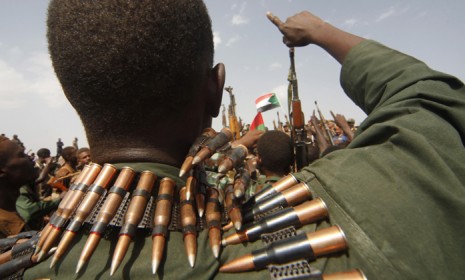The rekindled war in Sudan: 3 consequences
Sudan and South Sudan are back to the brink in their disputed oil-rich border region, which could deepen the refugee crisis still lingering from previous fighting

The United Nations Security Council demanded Tuesday that Sudan halt air strikes against its fledgling and estranged sister nation, South Sudan. The Sudanese army denies bombing its neighbor, but South Sudan says Sudan has essentially "declared war." U.S. Secretary of State Hillary Clinton says she's "very concerned" about the fighting, and urges both sides to pull their troops back from their shared border and resume peace talks. Here are three things at stake in the tense showdown:
1. The prevailing side gets much sought after oil revenues
The conflict in the border region comes down to one thing: Oil, say Yara Bayoumy and Sabrina Mao at Reuters. When South Sudan became an independent nation last year, it got most of the former united Sudan's oil reserves, under a 2005 peace agreement. Ever since, the two nations "have been unable to resolve a dispute over oil revenues" and where the border lies in their crude-rich frontier region. South Sudan, which gets 98 percent of its government revenue from oil but must use pipelines to Sudan's ports to export it, renewed tensions recently by seizing Sudan's Heglig oil field. It has since withdrawn, at the urging of foreign powers, but the damage to the already fragile peace has been done.
The Week
Escape your echo chamber. Get the facts behind the news, plus analysis from multiple perspectives.

Sign up for The Week's Free Newsletters
From our morning news briefing to a weekly Good News Newsletter, get the best of The Week delivered directly to your inbox.
From our morning news briefing to a weekly Good News Newsletter, get the best of The Week delivered directly to your inbox.
2. War will make a humanitarian crisis worse
"It's not just the fighting that matters," says Oxfam's Pauline Ballman at CNN, "but also the enormous suffering it causes those who have already been forced to flee it." Sudan's 22-year civil war left 2 million people dead, and drove hundreds of thousands of refugees into camps in the border region and Ethiopia. Unless peace can be restored, all the "progress made in the years following the 2005 peace agreement risks being lost." If war resumes, says Rick Moran at The American Thinker, "more refugees, more starvation, and more massacres will probably be the result."
3. Both countries could lose vital foreign aid
Even with help from abroad, it's going to take up to two years to rebuild oil industry infrastructure, says Moran at The American Thinker, "so the economies of both countries are likely to remain comatose for at least that long." But if the fighting continues "promised western aid will almost certainly be halted." Then the only help Sudan and South Sudan will get is likely to be humanitarian aid, says Kevin Watkins at Britain's Guardian, which will mean fewer hospitals and schools, and "more poverty."
A free daily email with the biggest news stories of the day – and the best features from TheWeek.com
-
 World’s oldest rock art discovered in Indonesia
World’s oldest rock art discovered in IndonesiaUnder the Radar Ancient handprint on Sulawesi cave wall suggests complexity of thought, challenging long-held belief that human intelligence erupted in Europe
-
 Claude Code: the viral AI coding app making a splash in tech
Claude Code: the viral AI coding app making a splash in techThe Explainer Engineers and noncoders alike are helping the app go viral
-
 ‘Human trafficking isn’t something that happens “somewhere else”’
‘Human trafficking isn’t something that happens “somewhere else”’Instant Opinion Opinion, comment and editorials of the day